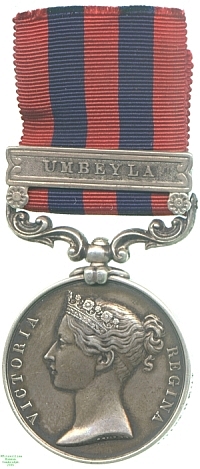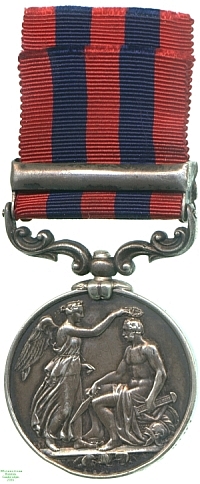
Obverse, a bust of Queen Victoria

Reverse, Victory crowning a seated Classical warrior with a laurel wreath

Obverse, a bust of Queen Victoria |

Reverse, Victory crowning a seated Classical warrior with a laurel wreath |
The Army of India Medal's issue in 1849 having marked the previous half-century's combats in the region, further conflicts in the 1850s led in 1854 to the design and issue of a General Service Medal for the theatre, for which bars would be issued as each new campaign merited.
British India met Afghanistan at the North-West Frontier. Since British influence over Afghanistan competed with the Burmese kingdom of Ava and Russia, the region beyond the frontier, composed of a large number of more-or-less independent tribal statelets, was of great importance to British interests and required continual suppression by `punitive expeditions'. For the lesser ones of these the North West Frontier bar was awarded in 1869, but some expeditions were thought to merit individual bars. One such was that of the Umbeyla Expedition in 1863 by the Yusafzai Field Force, sent to quell a rising by the Pathan Bunerwal tribe in combination with Hindustani Muslim extremists. The extremists' fort at Malka was destroyed but not without fierce Bunerwal resistance.
A memorial to those killed in the campaign still stands in the Umbeyla pass, including 22 men of the 101st Bengal Fusiliers, in whose ranks also served Private W. Small, whose medal this is. Lester Watson acquired it at some point before 1928.